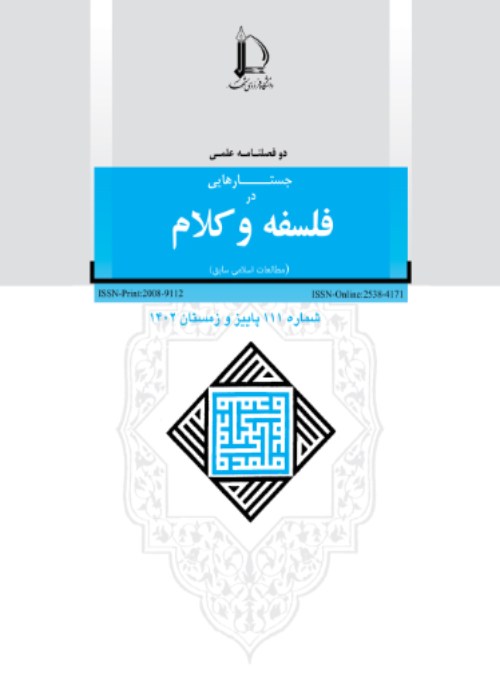The Issues Related to Knowledge in Mullā Sadrā's Three Philosophical Evolutions
Author(s):
Article Type:
Research/Original Article (دارای رتبه معتبر)
Abstract:
This article seeks to show the changes in issues related to knowledge based on Mullā Sadrā's three philosophical evolutions and graded approaches: the quidditative view, the ontological primacy of the existence in the graded unity framework, and the ontological primacy of the existence in the individual unity framework. The main question is, what changes have happened in the problems related to knowledge according to the three mentioned Sadrian tendencies? In this article, we have examined four such issues: "the truth of abstraction", "the way of subsistence of forms in the soul", "the unification or non-unification of the intellect with the intelligible", and "the knowledge of material beings". The result is that these issues are differently dealt with in each of the three approaches; For example, in the first approach, abstraction is in the form of "losing material accidents" in order for the perception to occur, while according to the second approach, abstraction is manifested as "the soul's journey in its existential degrees" and in the third approach, either it is not raised at all or can be discussed as "the soul's journey in its existential manifestations". The way of subsistence of forms in the soul according to the first approach is a kind of subsistence of inherence, and according to the second and third is subsistence of issuing and subsistence of manifesting respectively. The unification of the intellect with the intelligible has no place in the first Sadrian framework, but it is proved in the second approach as the unification of the knower and the known, and in the third, the unification is promoted to absolute unity. Regarding the knowledge of material entities, in the first approach, material entities do not have knowledge of themselves, nor knowledge of others, nor are they objects of knowledge; while according to the second and third frameworks and with the support of principles such as the concomitance of knowledge and existence, the predication of the "true reality" (ḥaqīqa) and the "intangible reality" (raqīqa), the fact that the divisions of existence are its very gradations, and the principle of simple truth, they both know themselves and others, and are objects of knowledge.
Keywords:
Language:
Persian
Published:
Islamic Philosophy & Theology, Volume:55 Issue: 1, 2023
Pages:
35 to 55
https://magiran.com/p2606298
دانلود و مطالعه متن این مقاله با یکی از روشهای زیر امکان پذیر است:
اشتراک شخصی
با عضویت و پرداخت آنلاین حق اشتراک یکساله به مبلغ 1,390,000ريال میتوانید 70 عنوان مطلب دانلود کنید!
اشتراک سازمانی
به کتابخانه دانشگاه یا محل کار خود پیشنهاد کنید تا اشتراک سازمانی این پایگاه را برای دسترسی نامحدود همه کاربران به متن مطالب تهیه نمایند!
توجه!
- حق عضویت دریافتی صرف حمایت از نشریات عضو و نگهداری، تکمیل و توسعه مگیران میشود.
- پرداخت حق اشتراک و دانلود مقالات اجازه بازنشر آن در سایر رسانههای چاپی و دیجیتال را به کاربر نمیدهد.
In order to view content subscription is required
Personal subscription
Subscribe magiran.com for 70 € euros via PayPal and download 70 articles during a year.
Organization subscription
Please contact us to subscribe your university or library for unlimited access!



